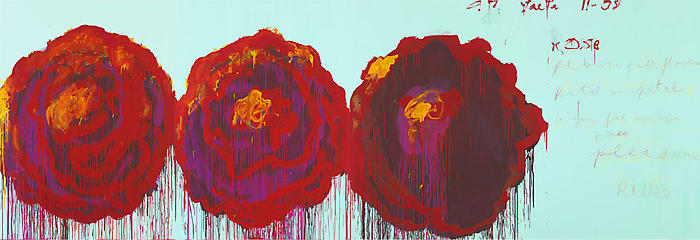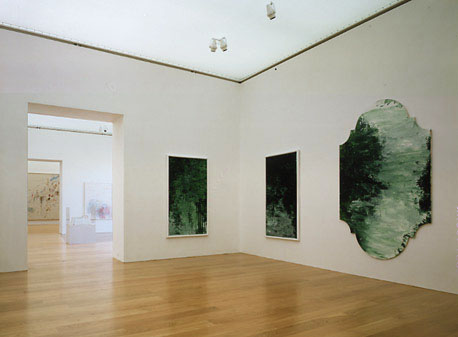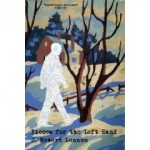
“This ‘Arth.â€
-Natty Bumppo
This is a made-up life in all meridians. Made up of dirt, moved by water and air, refined in fire, per ignem. Scattered about, and everything’s comin’ up roses.
In the print edition of Times Literary Supplement (May 1, 2009), Kelly Grovier writes about Cy Twombly’s paintings currently on display at Gagosian’s Gallery in London. (Unfortunately, the article is not accessible online.) Five paintings, each with four wood panels, three with full bloom roses, and one with scrawled fragments from “Les Roses†by German poet Rainer Maria Rilke. Probably most recognized for his “blackboard†paintings, which look like, well, blackboards, filled with student cursive handwriting exercises, Twombly has a gallery dedicated to him at the Menil Collection in Houston. I have wandered through it twice. It is an exquisite building, each room devoted to a different period of the artist’s work, many of the paintings including poetry integrated in the image, in what Grovier describes as a “blurring of boundaries between the visually unrefined and the verbally incoherent.†The effect is remarkable; I’ve wept in joyful melancholy thinking about them. The untitled “Green†paintings that fill one room are to my mind Pacific Northwest landscapes; or, rather, small west slope Cascades streamscapes.
 Painting is reading is gardening. Weeds everywhere.
Painting is reading is gardening. Weeds everywhere.
My favorite professor called it “the study of litter – ah – tour,†to rhyme with manure. He also told one of the best literary anecdotes I’ve heard. Teaching one evening class a week at the University of Minnesota, he had the habit of stoping for a drink after in a near-campus bar. Chatting with the new bartender one night, a Persian pre-med student, he said, “By the way, I’m Bill Lemons,†to which the bar-keep replied, “Call me Ishmael.â€
“Just outside of town, I pulled the rental car to a stop at the railroad crossing and watched a fully loaded Burlington Northern and Santa Fe coal train rumble over the dark, shiny rails that gleamed like mercury in the twilight. My mind matched the pace of the train, each thought snagging the next and hauling it in tow.â€
– Craig Johnson, The Dark Horse
Unrefined and incoherent. The makings for mix metaphor, the stirrings of organic relations. Read or mow? Is that the question? Physicality is a diversion, delightful at times, but wearing. Wearing out and renewing, cycles of seasons and imaginations. Cultivation sweeps things in and of the earth and the refined, other-earthly life of mind – composed, compacted, com-posted – raw material itself an idea. Is anything more non-representational than dirt? Where I grew up we gardened on Memorial Day, bore flowers to the graves of war-lost uncles and vets who’d passed. This long weekend of scattered pleasures I mowed and rooted around in the yard, bumped against neighbors, layered a thin film of UVB between my skin and the sun, and attended Durufle’s requiem mass. Seeds planted to be loosed from seeming death (“for if he had not hoped that they that were slain should rise again, it would have seemed superfluous and vain to pray for the deadâ€). The while my mind worked other fields, plowing one thought: This statement, my credo, my resilience in the notion of the life ideally lived in earth as it is in metaphor, not as it is in my backyard:
“And to earth we shall return. . . . It cost me considerable effort to discover that: to earth we shall return. The discovery caused me no sadness, it was exciting. Just thinking about it made me feel myself surrounded by the earth’s silence. . . . Somehow everything is made of earthy. A precious substance. Its abundance does not make it any less strange to feel – for it is difficult to feel that everything is really made of earth. Such unity. And why not the soul as well? My soul is woven from the finest earth. . . . And since everything is made of earth – what a wondrous, inexhaustible future we possess. An impersonal future which surpasses us. . . . Earth showed her bounty by separating us into persons – we have repaid her by being nothing other than earth.â€
That’s from “Earth’s Sweetness,†by Clarice Lispector (from Selected Cronicas, New Directions). Lispector was born in the Ukraine in 1925, but was only two months old when her parents moved her to Brazil. She studied law and journalism, published her first novel when she was seventeen, married a diplomat, and lived for almost two decades in Europe and Washington before returning to Brazil. I suppose she’s what is called a minor writer, but still truly original in the way she tells a story. Two volumes of her stories, The Stations of the Body and Where You Were at Night are collected in Soulstorm (also published by New Directions). Those titles suggest a lot. Amy Hempel in America reaches for some of these same odd corners of the heart, but she’s perennially hip – Lispector is not. Grace Paley used “longing†and “aloneness†to describe Lispector’s characters, and said that some of them try desperately to get out of Lispector’s stories. Lispector denies she penetrates at all: “I’ve tried to look closely into someone else’s face – a cashier at the movies. In order to learn the secret of her life. Useless. The other person is an enigma. And with eyes that are those of a statue: blind.â€
For a long period Lispector wrote a Saturday newspaper column on anything that came to mind – stories, reminiscences, diary-like musings, folklore, travel notes and speculative reveries such as “Earth’s Sweetness.†She was not particularly earth conscious in a “green†sense, although she did write a column about Thoreau, but to emphasize the imperative to live now rather than hoarding for the future, material or spiritual – “because we only exist from one now to the next.†Dozens of these pieces are collected in the Cronicas volume. Verve and openness, darkness and cunning – Lipsector knew it all deeply in the soil of her soul.
“They are offered to fuel that process of transformation which is reading.â€
– Steven Weisenburger, A Gravity’s Rainbow Companion
J. Robert Lennon’s novel Castle is getting good reviews. There’s a lot of dirt and woodsy goings-on, enough to make you itch. It is also a gripping psychological thriller, told retrospectively from the point of view of an American vet, one Eric Loesch, who mines his own broad garden, and whose narrative is so suspect you keep wondering why he doesn’t catch on. (I kept thinking of Martin Sheen’s Kit in Malick’s 1973 movie Badlands. Caught after a murder spree, a trooper tells him he’s “quite an individual,†and Kit asks, “Think they’ll take that into consideration?â€) Despite a rather trite plot, Castle has a strange contemporary creepiness that will keep you up until you finish it. Vets die in many ways before they die.
 And don’t miss Lennon’s Pieces for the Left Hand, one hundred very short stories purporting to be the offhand musings and anecdotes of a professional of some sort, now unemployed, walking the streets and fields of his small New England community, telling himself stories. Some of them are true. Some “have been embellished, or fabricated entirely,†he claims. They are all brilliant, and strike me as an American version of what Lispector was about with her chronicas. Funny, shocking, sentimental – each with a moral (Lennon would probably wince at that word, but . . .) as hard and crystalline as the haiku in “Brevity,†the last story in the book, all that’s left of the local novelist’s thousand page manuscript after it is chopped and whittled to satisfy the publisher.
And don’t miss Lennon’s Pieces for the Left Hand, one hundred very short stories purporting to be the offhand musings and anecdotes of a professional of some sort, now unemployed, walking the streets and fields of his small New England community, telling himself stories. Some of them are true. Some “have been embellished, or fabricated entirely,†he claims. They are all brilliant, and strike me as an American version of what Lispector was about with her chronicas. Funny, shocking, sentimental – each with a moral (Lennon would probably wince at that word, but . . .) as hard and crystalline as the haiku in “Brevity,†the last story in the book, all that’s left of the local novelist’s thousand page manuscript after it is chopped and whittled to satisfy the publisher.
This is the dirt that gathers in corners, settles on the porch swing and penetrates the pores.
Where were we? Oh yes, back on the farm:
whatever you have to say, leave
the roots on, let them
dangleAnd the dirt
just to make clear
where they came from
– Charles Olson, “These Daysâ€